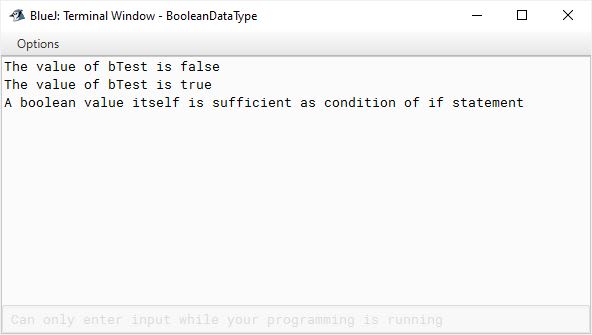The Boolean group has only one primitive data type boolean which is used to store the Boolean values true or false. The size of boolean is 8 bits but only one bit is used to actually store the value. Since boolean values can only be one of the two types true or false, one bit is enough to store them. As we have seen previously, boolean is the type required by conditional expressions that govern the if and for statements. Its time to look at a BlueJ program to see boolean types in action.
public class BooleanType
{
public void demoBoolean() {
//Declare a boolean variable
boolean bTest;
bTest = false;
System.out.println("The value of bTest is " + bTest);
bTest = true;
System.out.println("The value of bTest is " + bTest);
if (bTest)
System.out.println("A boolean value itself is " +
"sufficient as condition of if statement");
bTest = false;
if (bTest) //condition is false, println is not executed
System.out.println("This will not be printed");
}
}
We declare a variable of boolean type like this boolean bTest;. Next, we assign the boolean literal false to bTest and print its value. Notice in the output the value of bTest is printed as the word false.
Next we change the value of bTest to true and again print its value. As expected, its value gets printed as the word true.
Next bTest is used as the condition of if statement. As bTest is a boolean variable, it is itself sufficient as the condition of if statement. No need to write it as if (bTest == true), that will work too but it is kind of redundant.
Next we set bTest to false and use it in the if statement. As bTest is false, the println statement following it doesn’t get executed hence we don't see it in the output.